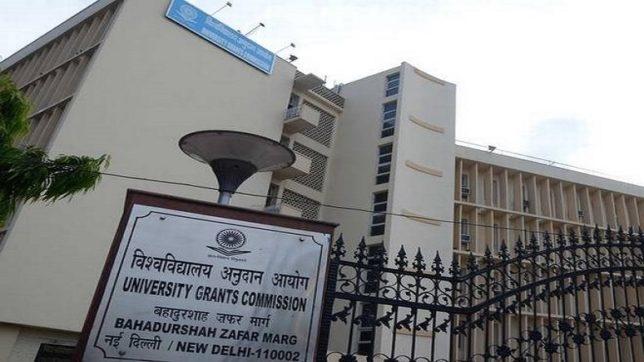Higher Education Commission will Affect Autonomy of Institutions, Say Experts

The Central government on Wednesday released a draft of the 'Higher Education Commission of India Act 2018', which seeks to replace the University Grants Commission (UGC) with a new body that will no longer have the powers to provide funds to colleges and universities. In its place, the Ministry of Human Resource Development will sanction funds.The Centre intends to table legislation to this effect in the monsoon session of parliament. Apart from prescribing academic standards and devising policies for higher education, the University Grants Commission presently funds the colleges and departments of Central Universities.
Unclear and unnecessary move
While government officials stated that the new body would focus more on improving academic standards, other stakeholders were not convinced that the step would help resolve the crisis in the higher education sector.
In a scathing statement, the Delhi University Teachers Association (DUTA) said it was unclear how the new overhaul would address the needs of higher education.
“The present structure is being completely replaced without providing a detailed study of the founding goals, achievements, shortcomings and possible reasons, and corrective measures taken or required to improve the health of the UGC," DUTA said.
“Even as the government had to shelve the proposal of creating HEERA [Higher Education Empowerment Regulation Agency] because of opposition, dismantling of the UGC to create a new agency looks like a quick desperate step in the same direction,” read the statement. HEERA, which was to replace the UGC and the All India Council for Technical Education, was opposed on the grounds that it would prevent effective regulation of the sector and give private players a free hand.
The statement further emphasised that the proposed commission did not have any representation of socially marginalised groups. "The 12-member Commission has no representation from SC/ST/OBC/PwD/Women. Reforms in higher education have to respond to the need of massification, accessibility and quality. Reforms should also necessarily respond to social responsibility and it is important to have the representation of various sections on the decision making body," added the statement.
The proposed bill has left institutions of national importance out of its ambit. Vikram Singh, General Secretary, Students Federation of India, said the new bill challenged the existence of these institutions as it was unclear how they would function in absence of the UGC. "How will they get funds, and to whom will they be affiliated - all these questions remain unanswered. In absence of the government's intervention, they are likely to be dependent on private players for funding. It will lead to more control of higher education being handed over to the private sector," said Singh.
Setting a dangerous precedent
Singh also challenged the provision of funding powers to the HRD ministry. "It is an effort to ensure direct control of institutions by political parties. If one department publishes a paper in its journal criticising the government over a policy measure, its funding may be curtailed,"added Singh.
"While members of the UGC have an academic background and are well-versed in the needs and use of funds, ministry officials may not know the requirements of various departments. This will severely affect the quality of institutions," added Singh.
Experts noted that the UGC had often prevented the direct interference of governments in educational institutions. Abha Dev Habib, former Executive Council member, Delhi University, said that if this proposal was implemented, universities would begin following informal orders from those in power too.
"For the past some time, we have seen the increased interference of governments in deciding academic structures, the purpose and focus of education while keeping academicians outside the ambit of policy making," he said.
The UGC could prevent the direct interference and influence of Governments. But when institutional heads feel that funding is under the direct control of the Ministry, they will be forced to carry out what is said to them even informally. One has to extrapolate to see how this change will unfold over the years," said Habib.
The new body will also be asked to specify norms for graded autonomy. Commenting on this, Habib said that it would only lead to the further privatisation of education. "The concepts of accreditation and graded autonomy are linked to privatisation of higher education. Recent Regulations on Graded Autonomy stratify universities on the basis of ratings and rankings. The 'autonomy' so granted is the freedom to start new courses, research parks, incubation centres and university society linkage centres, provided that they are able to generate the expenditure for these projects on their own. In the case of universities, this will only mean an increase in fees. Accreditation has become a new whip to enforce these changes, " added Habib.
Get the latest reports & analysis with people's perspective on Protests, movements & deep analytical videos, discussions of the current affairs in your Telegram app. Subscribe to NewsClick's Telegram channel & get Real-Time updates on stories, as they get published on our website.
























